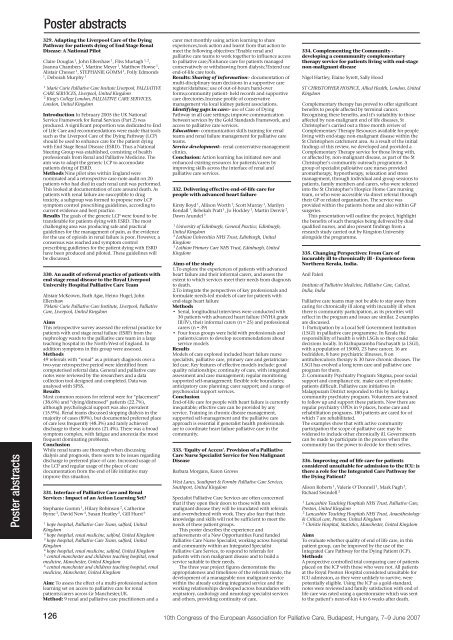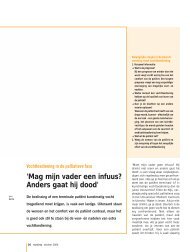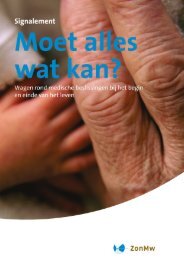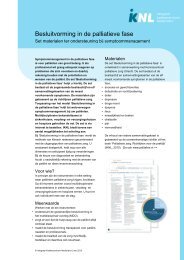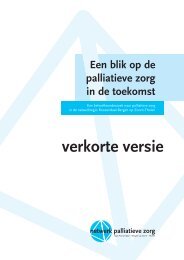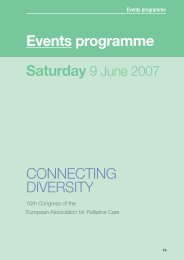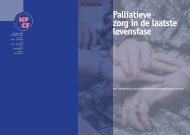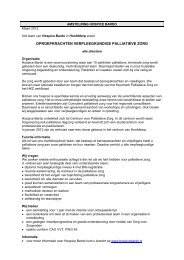Poster abstracts CONNECTING DIVERSITY
Poster abstracts CONNECTING DIVERSITY
Poster abstracts CONNECTING DIVERSITY
Create successful ePaper yourself
Turn your PDF publications into a flip-book with our unique Google optimized e-Paper software.
<strong>Poster</strong> <strong>abstracts</strong><br />
<strong>Poster</strong> <strong>abstracts</strong><br />
329. Adapting the Liverpool Care of the Dying<br />
Pathway for patients dying of End Stage Renal<br />
Disease: A National Pilot<br />
Claire Douglas 1 , John Ellershaw 1 , Fliss Murtagh 1, 2 ,<br />
Joanna Chambers 1 , Martine Meyer 1 , Matthew Howse 1 ,<br />
Alistair Chesser 1 , STEPHANIE GOMM 1 , Polly Edmonds<br />
1<br />
, Deborah Murphy 1<br />
1<br />
Marie Curie Palliative Care Insitute Liverpool, PALLIATIVE<br />
CARE SERVICES, Liverpool, United Kingdom<br />
2<br />
King’s College London, PALLIATIVE CARE SERVICES,<br />
London, United Kingdom<br />
Introduction In February 2005 the UK National<br />
Service Framework for Renal Services (Part 2) was<br />
produced. A significant proportion was dedicated to End<br />
of Life Care and recommendations were made that tools<br />
such as the Liverpool Care of the Dying Pathway (LCP)<br />
should be used to enhance care for the patient dying<br />
with End Stage Renal Disease (ESRD). Thus a National<br />
Steering Group was established, consisting of health<br />
professionals from Renal and Palliative Medicine. The<br />
aim was to adapt the generic LCP to accomodate<br />
patients dying of ESRD.<br />
Methods Nine pilot sites within England were<br />
nominated and a retrospective case-note audit on 20<br />
patients who had died in each renal unit was performed.<br />
This looked at documentation of care around death. As<br />
patients with renal failure are susceptible to drug<br />
toxicity, a subgroup was formed to propose new LCP<br />
symptom control prescribing guidelines, according to<br />
current evidence and best practice.<br />
Results The goals of the generic LCP were found to be<br />
transferable for patients dying with ESRD. The most<br />
challenging area was producing safe and practical<br />
guidelines for the management of pain, as the evidence<br />
for the use of opioids in renal failure is poor. However, a<br />
consensus was reached and symptom control<br />
prescribing guidleines for the patient dying with ESRD<br />
have been produced and piloted. These guidelines will<br />
be discussed.<br />
330. An audit of referral practice of patients with<br />
end stage renal disease to the Royal Liverpool<br />
University Hospital Palliative Care Team<br />
Alistair McKeown, Ruth Agar, Heino Hugel, John<br />
Ellershaw<br />
PMarie Curie Palliative Care Institute, Liverpool, Palliative<br />
Care, Liverpool, United Kingdom<br />
Aims<br />
This retrospective survey assessed the referral practice for<br />
patients with end stage renal failure (ESRF) from the<br />
nephrology wards to the palliative care team in a large<br />
teaching hospital in the North-West of England. In<br />
addition symptoms in this group were assessed.<br />
Methods<br />
49 referrals with “renal” as a primary diagnosis over a<br />
two-year retrospective period were identified from<br />
computerised referral data. General and palliative care<br />
notes were reviewed by the researchers and a data<br />
collection tool designed and completed. Data was<br />
analysed with SPSS.<br />
Results<br />
Most common reasons for referral were for “placement”<br />
(38.6%) and “dying/distressed” patients (22.7%),<br />
although psychological support was also prevalent<br />
(15.9%). Renal teams discussed stopping dialysis in the<br />
majority of cases (89%), but documented preferred place<br />
of care less frequently (48.3%) and rarely achieved<br />
discharge to these locations (21.4%). There was a broad<br />
symptom complex, with fatigue and anorexia the most<br />
frequent dominating problems.<br />
Conclusion<br />
While renal teams are thorough when discussing<br />
dialysis and prognosis, there seem to be issues regarding<br />
discharge to preferred place of care. Increased usage of<br />
the LCP and regular usage of the place of care<br />
documentation from the end of life initiative may<br />
improve this situation.<br />
331. Interface of Palliative Care and Renal<br />
Services : Impact of an Action Learning Set?<br />
Stephanie Gomm 1 , Hilary Robinson 2 , Catherine<br />
Byrne 3 , David New 4 , Susan Heatley 5 , Gill Hurst 6<br />
1<br />
hope hospital, Palliative Care Team, salford, United<br />
Kingdom<br />
2<br />
hope hospital, renal medicine, salford, United Kingdom<br />
3<br />
hope hospital, Palliative Care Team, salford, United<br />
Kingdom<br />
4<br />
hope hospital, renal medicine, salford, United Kingdom<br />
5<br />
central manchester and childrens teaching hospital, renal<br />
medicine, Manchester, United Kingdom<br />
6<br />
central manchester and childrens teaching hospital, renal<br />
medicine, Manchester, United Kingdom<br />
Aim: To assess the effect of a multi-professional action<br />
learning set on access to palliative care for renal<br />
patients/carers across Gr Manchester,UK.<br />
Method: 9 renal and palliative care practitioners and a<br />
carer met monthly using action learning to share<br />
experiences,took action and learnt from that action to<br />
meet the following objectives:?Enable renal and<br />
palliative care teams to work together to influence access<br />
to palliative care;?Enhance care for patients managed<br />
conservatively or withdrawing from dialysis;?Extend use<br />
end-of-life care tools.<br />
Results: Sharing of information:- documentation of<br />
multi-disciplinary team decisions in a supportive care<br />
register/database; use of out-of-hours hand-over<br />
forms;community patient- held records and supportive<br />
care directories.Increase profile of conservative<br />
management via local kidney patient associations.<br />
Identifying gaps in care:- use of Care of Dying<br />
Pathway in all care settings; improve communication<br />
between services by the Gold Standards Framework, and<br />
access to palliative care services.<br />
Education:- communication skills training for renal<br />
teams and renal failure management for palliative care<br />
teams.<br />
Service development:- renal conservative management<br />
clinics.<br />
Conclusion: Action learning has initiated new and<br />
enhanced existing resources for patients/carers by<br />
improving skills across the interface of renal and<br />
palliative care services.<br />
332. Delivering effective end-of-life care for<br />
people with advanced heart failure<br />
Kirsty Boyd 1 , Allison Worth 1 , Scott Murray 1 , Marilyn<br />
Kendall 1 , Rebekah Pratt 1 , Jo Hockley 1 , Martin Denvir 2 ,<br />
Dawn Arundel 3<br />
1<br />
University of Edinburgh, General Practice, Edinburgh,<br />
United Kingdom<br />
2<br />
Lothian Universities NHS Trust, Edinburgh, United<br />
Kingdom<br />
3<br />
Lothian Primary Care NHS Trust, Edinburgh, United<br />
Kingdom<br />
Aims of the study<br />
1.To explore the experiences of patients with advanced<br />
heart failure and their informal carers, and assess the<br />
extent to which services meet their needs from diagnosis<br />
to death.<br />
2.To integrate the perspectives of key professionals and<br />
formulate needs-led models of care for patients with<br />
end-stage heart failure<br />
Methods<br />
• Serial, longitudinal interviews were conducted with<br />
30 patients with advanced heart failure (NYHA grade<br />
III/IV), their informal carers (n = 25) and professional<br />
carers (n = 39)<br />
• Four focus groups were held with professionals and<br />
patients/carers to develop recommendations about<br />
service models<br />
Results<br />
Models of care explored included heart failure nurse<br />
specialists, palliative care, primary care and geriatricianled<br />
care. Key features of effective models include: good<br />
quality relationships; continuity of care, with integrated<br />
assessment and case management; regular monitoring;<br />
supported self-management; flexible role boundaries;<br />
anticipatory care planning; carer support; and a range of<br />
psychosocial support services.<br />
Conclusion<br />
End-of-life care for people with heart failure is currently<br />
inequitable; effective care can be provided by any<br />
service. Training in chronic disease management,<br />
supported self-management and the palliative care<br />
approach is essential if generalist health professionals<br />
are to coordinate heart failure palliative care in the<br />
community.<br />
333. ‘Equity of Access’. Provision of a Palliative<br />
Care Nurse Specialist Service for Non Malignant<br />
Disease<br />
Barbara Morgans, Karen Groves<br />
West Lancs, Southport & Formby Palliative Care Services,<br />
Southport, United Kingdom<br />
Specialist Palliative Care Services are often concerned<br />
that if they open their doors to those with non<br />
malignant disease they will be inundated with referrals<br />
and overwhelmed with work. They also fear that their<br />
knowledge and skills will not be sufficient to meet the<br />
needs of these patient groups.<br />
This poster describes the experience and<br />
achievements of a New Opportunities Fund funded<br />
Palliative Care Nurse Specialist, working across hospital<br />
and community within an Integrated Specialist<br />
Palliative Care Service, to respond to referrals for<br />
patients with non malignant disease and to build a<br />
service suitable to their needs.<br />
The three year project figures demonstrate the<br />
appropriateness and timeliness of the referrals made, the<br />
development of a manageable non malignant service<br />
within the already existing integrated service and the<br />
working relationships developed across boundaries with<br />
respiratory, cardiology and neurology specialist services<br />
and others, providing continuity of care.<br />
334. Complementing the Community -<br />
developing a commmunity complementary<br />
therapy service for patients living with end-stage<br />
non-malignant disease<br />
Nigel Hartley, Elaine Syrett, Sally Hood<br />
ST CHRISTOPHER HOSPICE, Allied Health, London, United<br />
Kingdom<br />
Complementary therapy has proved to offer significant<br />
benefits to people affected by terminal cancer.<br />
Recognising these benefits, and it’s suitability to those<br />
affected by non-malignant end of life diseases, St<br />
Christopher’s carried out a three month review of<br />
Complementary Therapy Resources available for people<br />
living with end-stage non-malignant disease within the<br />
St Christophers catchment area. As a result of the initial<br />
findings of this review, we developed and provided a<br />
Complementary Therapy service for those living with,<br />
or affected by, non-malignant disease, as part of the St<br />
Christopher’s community outreach programme. A<br />
group of specialist palloiative care nurses provided<br />
aromatherapy, hypnotherapy, relaxation and stress<br />
management, through individual and group sessions to<br />
patients, family members and carers, who were referred<br />
into the St Christopher’s Hospice Home Care nursing<br />
team, or who were accessible via direct referral through<br />
their GP or related organisation. The service was<br />
provided within the patients home and also within GP<br />
surgeries.<br />
This presentation will outline the project, highlight<br />
the benefits of such therapies being delivered by dual<br />
qualified nurses, and also present findings from a<br />
research study carried out by Kingston University<br />
alongside the programme.<br />
335. Changing Perspectives: From Care of<br />
incurably ill to chronically ill - Experience form<br />
Northern Kerala, India.<br />
Anil Paleri<br />
Institute of Palliative Medicine, Palliaitve Care, Calicut,<br />
India, India<br />
Palliative care teams may not be able to stay away from<br />
caring for chronically ill along with incurably ill when<br />
there is community participation, as its priorities will<br />
reflect in the program and issues are similar. 2 examples<br />
are discussed.<br />
1: Participation by a Local Self Government Institution<br />
(LSGI) in palliative care programme. In Kerala the<br />
responsibility of health is with LSGIs so they could take<br />
decisions locally. In Kizhuparamba Panchayath (a LSGI),<br />
with a population of 15000, 23 have cancer, 16 are<br />
bedridden, 8 have psychiatric illnesses, 8 on<br />
antituberculosis therapy & 30 have chronic diseases. The<br />
LSGI has evolved a long term care and palliative care<br />
program for them.<br />
2: Community Psychiatry Program: Stigma, poor social<br />
support and compliance etc. make care of psychiatric<br />
patients difficult. Palliative care initiatives in<br />
Malappuram District responded to this by having a<br />
community psychiatry program. Volunteers are trained<br />
to follow up and support these patients. Now there are<br />
regular psychiatry OPDs in 9 places, home care and<br />
rehabilitation programs. 180 patients are cared for of<br />
which 7 are rehabilitated.<br />
The examples show that with active community<br />
participation the scope of palliative care may be<br />
widened to include other chronically ill. Governments<br />
can be made to participate in the process when the<br />
community has the power to decide for them selves.<br />
336. Improving end of life care for patients<br />
considered unsuitable for admission to the ICU: is<br />
there a role for the Integrated Care Pathway for<br />
the Dying Patient?<br />
Alison Roberts 1 , Valerie O’Donnell 1 , Mark Pugh 2 ,<br />
Richard Swindell 3<br />
1<br />
Lancashire Teaching Hospitals NHS Trust, Palliative Care,<br />
Preston, United Kingdom<br />
2<br />
Lancashire Teaching Hospitals NHS Trust, Anaesthesiology<br />
& Critical care, Preston, United Kingdom<br />
3<br />
Christie Hospital, Statistics, Manchester, United Kingdom<br />
Aims<br />
To evaluate whether quality of end of life care, in this<br />
patient group, can be improved by the use of the<br />
Integrated Care Pathway for the Dying Patient (ICP).<br />
Methods<br />
A prospective controlled trial comparing care of patients<br />
placed on the ICP with those who were not. All patients<br />
at the Royal Preston Hospital considered unsuitable for<br />
ICU admission, as they were unlikely to survive, were<br />
potentially eligible. Using the ICP as a gold-standard,<br />
notes were reviewed and family satisfaction with end of<br />
life care was rated using a questionnaire which was sent<br />
to the patient’s next-of-kin 4 to 6 weeks after death.<br />
126 10th Congress of the European Association for Palliative Care, Budapest, Hungary, 7–9 June 2007


